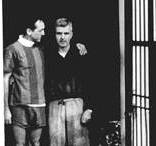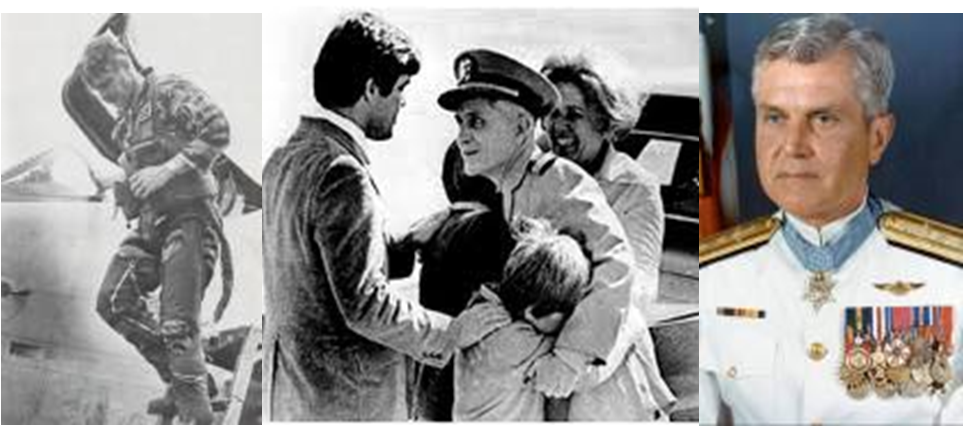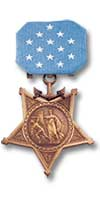by Orson Swindle (USMC, Ret) Prisoner of War in North Viet Nam
(Orson Swindle was shot down on November 11, 1966, released on March 4, 1973)
Reproduced with permission of USNI and the author
… for conspicuous gallantry and intrepidity at the risk of his life above and beyond the call of duty while Senior Naval Officer in the Prisoner of War camps of North Vietnam on 4 September 1969. Recognized by his captors as the leader in the Prisoners’ of War resistance to interrogation and in their refusal to participate in propaganda exploitation, Rear Admiral Stockdale was singled out for interrogation and attendant torture after he was detected in a covert communications attempt…
… Sensing the start of another purge, and aware that his earlier efforts at self-disfiguration to dissuade his captors from exploiting him for propaganda purposes had resulted in cruel and agonizing punishment, Rear Admiral Stockdale resolved to make himself a symbol of resistance regardless of personal sacrifice. He deliberately inflicted a near-mortal wound to his person in order to convince his captors of his willingness to give up his life rather than capitulate. He was subsequently discovered and revived by the North Vietnamese who, convinced of his indomitable spirit, abated in their employment of excessive harassment and torture toward all of the Prisoners of War. By his heroic action, at great peril to himself, he earned the everlasting gratitude of his fellow prisoners and of his country… MEDAL OF HONOR citation
The country, the Navy, the Stockdale family, especially his beloved wife, Sybil, and those of us who were POWs in North Vietnam suffered a terrible loss with the passing on 5 July (2005) of Vice Admiral James B. Stockdale. Husband, father, patriot, mentor, author, and dear friend, he touched our lives profoundly. Distinguished graduate of the Naval Academy, Medal of Honor recipient, courageous warrior, brilliant leader, almost bigger than life, he never stopped inspiring us. It is difficult to accept that he is gone. We recognize how fortunate we are that he came our way.
The POW experience was a real-time laboratory on leadership. Led by Admiral Stockdale’s example, we prisoners lived and struggled to return with honor. He inspired each of us to lead in the most bizarre and painful of circumstances where to accept the mantle of leader meant certain suffering. But accept it we did.
I first encountered Jim Stockdale many years ago, and he changed my life.
Late spring 1967 was a bad time for POWs in Hanoi. I was in my sixth month of imprisonment, living alone in a small windowless cell. I was not feeling good about myself, having broken under torture and written a propaganda statement. These were trying times, testing our spirit, our will, and our physical and mental stamina.
Our cellblock, occupied by about 18 junior officers, consisted of ten cells. We communicated with each other by tapping on walls or lying on the filthy floor, peeking under the door to be sure the guards had left the area and then whispering along the passageway. Communicating was forbidden. The price for getting caught was solitary or torture.
But communicating was our lifeblood; we never stopped. For me, with my morale sinking, whispering and tapping with other POWs was enabling me to hang on. Late one evening I heard the muffled sounds of guards moving a new prisoner into a cell block about three cells down from me. The next day, when the guards vacated the block, I was down on the floor whispering to the “new guy,” asking him to identify himself and join in the communications stream. Commander James Bond Stockdale checked in.
I was overwhelmed by his presence. Here next to me was our leader, a prisoner since 1965 and the senior Navy captive, and I was in direct contact with him. We were faintly aware of his most recent ordeal. Our admiration for him is difficult to describe. In the days that followed, Jim was not communicating much, as he was recovering both physically and mentally from pain recently inflicted. Sadly, there was to be much more suffering for him.
One day we young officers were discussing some issue and finding no answers. I whispered down the passageway, “Hang on for a minute, and let me ask the Old Man what we should do.” Commander Stockdale came up after a couple of calls, and responded with a wise answer to our problem.
 Now fast forward to February 1973, almost six years later. We have been told we are going home. In the large courtyard area of Ho Loa prison (the Hanoi Hilton), the North Vietnamese are allowing one large cell of Americans at a time to wander over to the recently uncovered windows of other cells that surrounded the courtyard, permitting conversation. I see a slight man, terribly worn and tired looking with very grey hair limping over to my window. He looks up at me, smiles, and says, “Hi, I’m Jim Stockdale, who are you?” We literally had never seen each other before.
Now fast forward to February 1973, almost six years later. We have been told we are going home. In the large courtyard area of Ho Loa prison (the Hanoi Hilton), the North Vietnamese are allowing one large cell of Americans at a time to wander over to the recently uncovered windows of other cells that surrounded the courtyard, permitting conversation. I see a slight man, terribly worn and tired looking with very grey hair limping over to my window. He looks up at me, smiles, and says, “Hi, I’m Jim Stockdale, who are you?” We literally had never seen each other before.
I reply, “Sir, I am Orson Swindle, Marine, and I want to thank you for your leadership and the inspiration you have provided to me, to all of us. Your leadership and personal conduct helped me survive these past six years. You very likely saved my life.”
I continue, “I remember a day back in the spring of 1967, when you moved into my area of the cell block. My morale and self-esteem were pretty low then. I was really down on myself. I recall how having you around and knowing what you had endured reminded me of my duty, my obligations, and what was expected of me. You inspired me by your mere presence. I am eternally indebted to you.”
Jim smiles and says, “Orson, I remember you and those difficult days so well. 1 was really depressed and down on myself, too. I want you to know that when you whispered, ‘Hang on for a minute, and let me ask the Old Man what we should do,’ you reminded me of who I was and of my duty to each of you. Orson, you helped me survive, too.”
It is said that leaders are like eagles. They don’t flock. You have to find them one at a time. Jim Stockdale was an eagle. To paraphrase President Reagan, most people go through life wondering if they had made a difference. Jim Stockdale did not have that problem.






